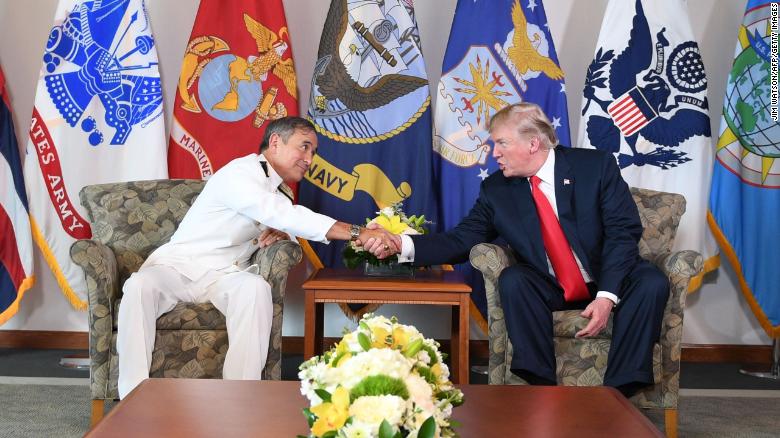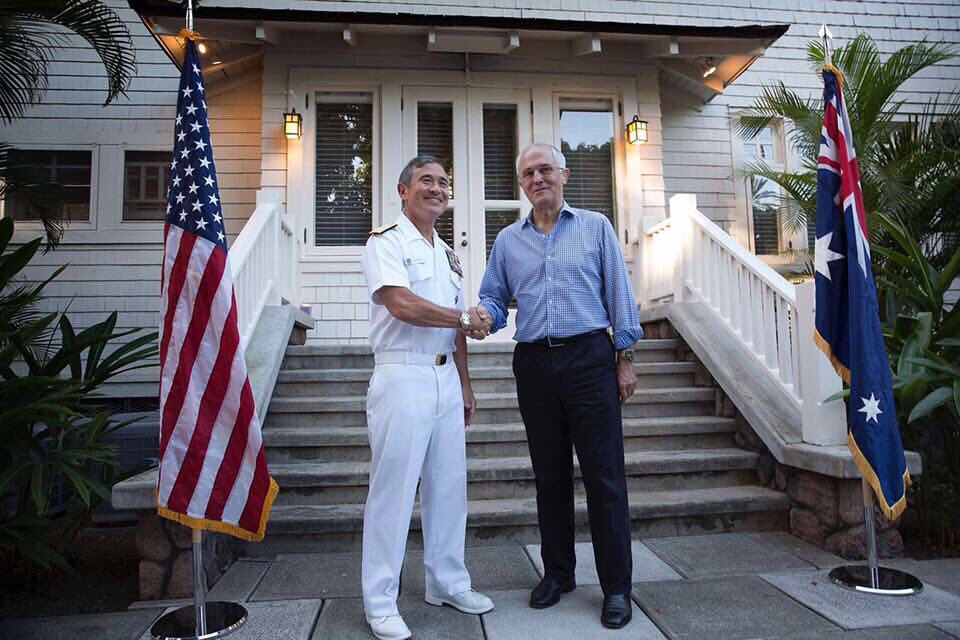By Ben Westcott
China is seeking to "undermine" the international order in the Asia Pacific, Adm. Harry Harris, US President Donald Trump's nominee for ambassador to Australia, said in Washington on Wednesday.
Addressing the US Committee on Armed Services on the challenges facing the US military in the region, Adm. Harris, the highest commander of US forces in Asia Pacific region, said the Trump administration must work to counter Beijing's influence in the region.
"China's intention is crystal clear. We ignore it at our peril," he said in public testimony.
"I'm concerned China will work to undermine the international rules-based order."
Plain-spoken and well-known in the international community for his remarks on US policy in the Asia Pacific, Harris has often provoked a vitriolic reaction from Beijing, in particular for his passionate calls for action in the South China Sea.
His appointment would raise the stakes in the battle for influence in Asia, with experts saying Harris could push the Australian government to tighten military cooperation with its traditional ally.

US President Donald Trump meets with Admiral Harry B. Harris, Jr. in Hawaii on November 3, 2017.
The head of US Pacific Command, Harris was announced in early February as US President Trump's pick as the next ambassador to Australia.
The ambassadorship to Australia has been empty for almost 18 months following the end of the former incumbent John Berry's term in September 2016 -- one of a number of key Asia roles that haven't been filled by the Trump administration.
Harris' appointment must be confirmed by the US Congress, and it's not clear exactly when that will happen.
During his testimony to the committee on Wednesday, Harris said China was trying to reorder the Indo-Pacific through "military modernization, influence operations and predatory economics."
"China's impressive military build up could soon challenge the US across every domain ... If the US does not keep pace, (US Pacific Command) will struggle to compete with the People's Liberation Army on future battlefields," he said.
Taking the gloves off
Born in Yokosuka, Japan, the son of an American naval officer and a Japanese mother, Harris ascended through the ranks of the US Navy to become the highest commander in the Asia Pacific region.
Carl Schuster, former director of operations at the US Pacific Command's Joint Intelligence Center, told CNN that Harris was greatly respected by the armed forces and in political circles in Washington DC.
"He may be a good advocate for Australia's interests and position ... He has credibility with the Trump administration so he could very well be viewed as two-way conduit," he said.
Australian leaders warmly welcomed the news of Harris' appointment, including Prime Minister Malcolm Turnbull who has met with the admiral in Hawaii on at least one occasion.
"Great to see Admiral Harry Harris nominated by (Donald Trump) as US ambassador to Australia. Look forward to seeing you in Canberra, Harry," Turnbull said on his official Twitter on February 10.

Schuster said Adm. Harris was an "innovative and flexible thinker," who was a strong advocate for a strong advocate for tighter ties between the US and its allies in Asia.
The admiral's harsh rhetoric comes at a time when Australia finds itself caught between its longtime ally the United States and its major economic partner China.
Euan Graham, director of the International Security Program at Sydney's Lowy Institute, told CNN Harris could help the Trump administration put more pressure on Australia to follow the US line.
Trump picks top Pacific commander to be Australia ambassador
"Australia can't continue to expect that it will be able to have its cake and eat it too when it comes to the economic relationship with China and (its US ally),"
"(Harris) is someone who is prepared to take the gloves off when it comes to making hard choices in the relationship between China and the US."
Australia could be more receptive than usual to US persuasion -- in recent months, the government has been taking a hard look at Beijing's influence in Australia, after an opposition Labor Party senator stepped down over taking large donations from a Chinese businessman.
The admiral could push Canberra to show greater enthusiasm for ongoing talks between India, Japan, Australia and the United States about taking part in the Quadrilateral Security Dialogue, Graham said, with the aim of containing China.
"His nomination singles an interest on the part of the administration to make sure that Australia steps up on questions of defense cooperation, alliance cooperation, where China is concerned," he said.
Harris has been a longtime critic of the Chinese military's island building campaign in the South China Sea, a position he continued on Wednesday citing Beijing's aggressions in the area.
In a lecture in Sydney in December 2016, Harris said the US would not give up "shared domains" at sea, "no matter how many bases are built on artificial features in the South China Sea."
Schuster said rather than having an aggressive attitude towards Beijing, Harris instead had a realistic approach to China.
"He sees China as a strategic competitor to the US ... he looks at the South China Sea and thinks if we keep ignoring what China is doing there, then China will win by default," he said.
The Chinese government has expressed its open dislike for Harris on multiple occasions in state media and is unlikely to be pleased at the news of his ambassadorship.
In February 2016, Chinese state media Xinhua infamously questioned whether Harris' Japanese ancestry, on his mother's side, had influenced his opinion on the South China Sea.
"Some may say an overemphasis on his background as a Japanese-American general is a bit unkind .. But to understand the Americans' sudden upgraded offensive in the South China Sea, it is simply impossible to ignore Admiral Harris' blood, background, political inclination and values," the piece read.
Graham said any loud protests by the Chinese government could backfire, particularly given the recent atmosphere of outrage in Australia over allegations of attempts by Beijing to influence domestic policy.
"I think the response, by and large, in Australia would be to swing behind the US alliance," he said.
Plain-spoken and well-known in the international community for his remarks on US policy in the Asia Pacific, Harris has often provoked a vitriolic reaction from Beijing, in particular for his passionate calls for action in the South China Sea.
His appointment would raise the stakes in the battle for influence in Asia, with experts saying Harris could push the Australian government to tighten military cooperation with its traditional ally.

US President Donald Trump meets with Admiral Harry B. Harris, Jr. in Hawaii on November 3, 2017.
The head of US Pacific Command, Harris was announced in early February as US President Trump's pick as the next ambassador to Australia.
The ambassadorship to Australia has been empty for almost 18 months following the end of the former incumbent John Berry's term in September 2016 -- one of a number of key Asia roles that haven't been filled by the Trump administration.
Harris' appointment must be confirmed by the US Congress, and it's not clear exactly when that will happen.
During his testimony to the committee on Wednesday, Harris said China was trying to reorder the Indo-Pacific through "military modernization, influence operations and predatory economics."
"China's impressive military build up could soon challenge the US across every domain ... If the US does not keep pace, (US Pacific Command) will struggle to compete with the People's Liberation Army on future battlefields," he said.
Taking the gloves off
Born in Yokosuka, Japan, the son of an American naval officer and a Japanese mother, Harris ascended through the ranks of the US Navy to become the highest commander in the Asia Pacific region.
Carl Schuster, former director of operations at the US Pacific Command's Joint Intelligence Center, told CNN that Harris was greatly respected by the armed forces and in political circles in Washington DC.
"He may be a good advocate for Australia's interests and position ... He has credibility with the Trump administration so he could very well be viewed as two-way conduit," he said.
Australian leaders warmly welcomed the news of Harris' appointment, including Prime Minister Malcolm Turnbull who has met with the admiral in Hawaii on at least one occasion.
"Great to see Admiral Harry Harris nominated by (Donald Trump) as US ambassador to Australia. Look forward to seeing you in Canberra, Harry," Turnbull said on his official Twitter on February 10.

Schuster said Adm. Harris was an "innovative and flexible thinker," who was a strong advocate for a strong advocate for tighter ties between the US and its allies in Asia.
The admiral's harsh rhetoric comes at a time when Australia finds itself caught between its longtime ally the United States and its major economic partner China.
Euan Graham, director of the International Security Program at Sydney's Lowy Institute, told CNN Harris could help the Trump administration put more pressure on Australia to follow the US line.
Trump picks top Pacific commander to be Australia ambassador
"Australia can't continue to expect that it will be able to have its cake and eat it too when it comes to the economic relationship with China and (its US ally),"
"(Harris) is someone who is prepared to take the gloves off when it comes to making hard choices in the relationship between China and the US."
Australia could be more receptive than usual to US persuasion -- in recent months, the government has been taking a hard look at Beijing's influence in Australia, after an opposition Labor Party senator stepped down over taking large donations from a Chinese businessman.
The admiral could push Canberra to show greater enthusiasm for ongoing talks between India, Japan, Australia and the United States about taking part in the Quadrilateral Security Dialogue, Graham said, with the aim of containing China.
"His nomination singles an interest on the part of the administration to make sure that Australia steps up on questions of defense cooperation, alliance cooperation, where China is concerned," he said.
Harris has been a longtime critic of the Chinese military's island building campaign in the South China Sea, a position he continued on Wednesday citing Beijing's aggressions in the area.
In a lecture in Sydney in December 2016, Harris said the US would not give up "shared domains" at sea, "no matter how many bases are built on artificial features in the South China Sea."
Schuster said rather than having an aggressive attitude towards Beijing, Harris instead had a realistic approach to China.
"He sees China as a strategic competitor to the US ... he looks at the South China Sea and thinks if we keep ignoring what China is doing there, then China will win by default," he said.
The Chinese government has expressed its open dislike for Harris on multiple occasions in state media and is unlikely to be pleased at the news of his ambassadorship.
In February 2016, Chinese state media Xinhua infamously questioned whether Harris' Japanese ancestry, on his mother's side, had influenced his opinion on the South China Sea.
"Some may say an overemphasis on his background as a Japanese-American general is a bit unkind .. But to understand the Americans' sudden upgraded offensive in the South China Sea, it is simply impossible to ignore Admiral Harris' blood, background, political inclination and values," the piece read.
Graham said any loud protests by the Chinese government could backfire, particularly given the recent atmosphere of outrage in Australia over allegations of attempts by Beijing to influence domestic policy.
"I think the response, by and large, in Australia would be to swing behind the US alliance," he said.

Aucun commentaire:
Enregistrer un commentaire